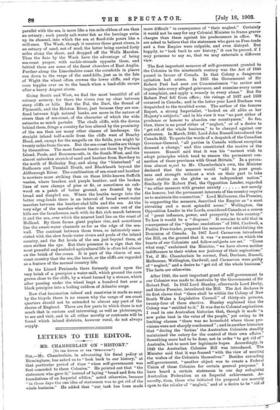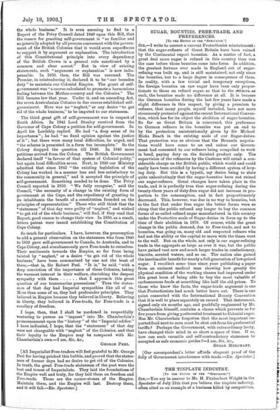LETTERS TO THE EDITOR.
' MR. CHAMBERLAIN ON "HISTORY."
[To THE EDITOR OP THE "SPECTATOR.")
Sza,—Mr. Chamberlain, in advocating his fiscal policy at Birmingham, has asked us to "look back to our history," at that particular period of time "when self-government was first conceded to these Colonies." He pointed out that "the statesmen who gave it," instead of laying "broad and firm the foundations of an Imperial edifice," acted otherwise, because "in those days the one idea of statesmen was to get rid of the whole business." He added that "oar task has been made
more difficult" in consequence of "their neglect." Certainly it would not be easy for any Colonial Minister to frame graver charges than these against his predecessors in office. We are asked to believe that the statesmen who gave us Free-trade and a free Empire were culpable, and even disloyal. But happily, to "look back to our history," it can be proved, if I may presume to say so, that we may entertain a different view.
The first important measure of self-government granted to the Colonies in the nineteenth century was the Act of 1840 passed in favour of Canada. In that Colony a dangerous agitation had arisen. In 1835 the Government of Sir Robert Peel had sent out Commissioners "to review and inquire into every alleged grievance, and examine every cause of complaint, and apply a remedy to every abuse." But Sir Robert Peel fell from office ; the risings of 1837 and 1838 occurred in Canada; and in the latter year Lord Durham was despatched to the troubled scene. The author of the famous Report, a strong Imperialist, "looked on all alike as her Majesty's subjects," and in his view it was "no part either of prudence or honour to abandon our countrymen." So far, then, there is no proof either of "neglect," or of a desire to "get rid of the whole business," to be charged against our statesmen. In March, 1840, Lord John Russell introduced the Canada Bill. To quote the words of a despatch of the Canadian Governor-General, "all parties in Canada without exception demand a change," and this constituted the motive of the measure. Russell said that it was his "earnest wish to adopt principles which tend to ensure the permanent con- nection of those provinces with Great Britain." In a perora- tion almost ecual to Mr. Chamberlain's own, the Minister declared that the measure would "add • to your great- ness and strength without a wish on their part to take their station on the globe as an independent nation." Similarly Sir Robert Peel, the Opposition Leader, regarded -
" no other measure with greater anxiety not merely the honour, but the permanent interests of the country require Us to maintain the connection." Lord Melbourne, the Premier, in supporting the measure, described the Empire as "a most elevating and a most splendid scene." Wellington, the Opposition Leader in the Lords, considered Canada as a source of "great influence, power, and prosperity to this country." To lose it would be a "disgrace." It remains to add that in consequence of the "Quebec resolutions" of 1864, Cardwell, a Peelite Free-trader, prepared the measure for establishing the Dominion of Canada. In 1867 Lord Carnarvon introduced the Bill, on the ground that it was "a measure on which the hearts of our Colonists and fellow-subjects are set." "Come what may," exclaimed the Minister, "we have shown neither
indifference to their wishes nor jealousy of their aspirations." Yet, if Mr. Chamberlain be correct, Peel, Durham, Russell,
Melbourne, Wellington, Cardwell, and Carnarvon were guilty of "neglect," and a desire to "get rid of the whole business." The facts are otherwise.
After 1840, the next important grant of self-government to our Colonies was made to 'Australia by the Government of Sir Robert Peel. In 1842 Lord Stanley, afterwards Lord Derby, and thrice Premier, introduced the Bill. The Act declares in its first clause that "there shall be within the Colony of New Smith Wales a Legislative Council" of thirty-six persons, twenty-four of them elective. Stanley explained that the Colony was "entitled to it." It was due to Colonial aspirations. I read in one Australian historian that, though it made "a new pulse beat in the veins of the people," yet owing to its limiting clauses "there was no household where those pro- visions were not sharply condemned " ; and in another historian that "during the ' forties ' the Australian Colonists steadily maintained the outcry for the control of their own affairs." Something more had to be done, not in order "to get rid of" Australia, but to meet her legitimate hopes. Accordingly, in 1849 the Australian Colonies Bill was introduced. The Minister said that it was framed "with the view of meeting the wishes of the Colonists 'themselves." Besides extending self-government, "another object was to create a Federal Union of these ,Colonies for certain general purposes." I have heard a certain statesman in our day eulogising Australian Federation as an Imperial achievement. As- suredly, then, those who initiated the proposal are scarcely open to the rebuke of "neglect," and of a desire to be "rid of
the whole business." It is even amusing to find in a Report of the Privy Council dated 1849 upon this Bill, that the reason for granting self-government is "so familiar and so generally adopted by all persons conversant with the govern- ment of the British Colonies that it would seem superfluous to support it by argument or explanation. The introduction of this Constitutional principle into every dependency of the British Crown is a general rule sanctioned by a common and clear assent." But in view of existing statements, such "argument or explanation" is now indis- pensable. In 1850, then, the Bill was resumed. The Premier, in reintroducing it, declared it to be "our bounden duty" to maintain our Colonial Empire. The grant of self- government was "a course calculated to promote a harmonious feeling between the Mother-country and the Colonies." The Bill became law that year. Under it, and an amending Act, the seven Australasian Colonies in due course established self- goveimment. Here was no "neglect," or any desire "to get rid of the whole business," to be imputed to our statesmen.
The third great gift of self-government was in respect of South Africa. In 1642 Lord Stanley received from the Governor of Cape Colony a petition for self-government. In April his Lordship replied. He had "a deep sense of its importance " ; he had "no fixed opinion against the justice of it " ; but there were many local difficulties, he urged, and "the scheme is presented in a form too incomplete." So the Colony dropped the question till 1846. In 1846 more petitions arrived from the Colony. The British Government declared itself "in favour of that system of Colonial polity," but again local difficulties arose. Next, in 1849 our Ministry admitted that since 1842 "the existing legislation of the Colony has worked in a manner less and less satisfactory to the community in general," and it accepted the principle of self-government. Something needed to be done. The Privy Council reported in 1850. "We fully recognise," said the Council, "the necessity of a change in the existing form of government at the Cape, and the expediency of granting to its inhabitants the benefit of a constitution founded on the principles of representation." Those who still think that the "statesmen" of that day were guilty of "neglect," and wished "to get rid of the whole business," will find, if they read that Report, good reason to change their view. In 1850, as a result, letters patent were issued establishing the Constitution of Cape Colony.
So much for particulars. I have, however, the presumption to add a general observation on the statesmen who from 1840 to 1850 gave self-government to Canada, to Australia, and to Cape Colony, and simultaneously gave Free-trade to ourselves. Their sentiments towards the Empire, so far from being tainted by "neglect," or a desire "to get rid of the whole business," have been summarised by one not the least of them,—that is, Sir Robert Peel "It is," he said, "with a deep conviction of the importance of these Colonies, taking the warmest interest in their welfare, cherishing the deepest sympathy with them that I approach this great question of our transmarine possessions." Thus the states- men of that day had Imperial sympathies like all of us. More than some of us, they had profounder principles. They believed in Empire because they believed in liberty. Believing in liberty, they believed in Free-trade, for Free-trade is a corollary of freedom.
I hope, then, that I shall be pardoned in respectfully venturing to pursue an " inquest " into Mr. Chamberlain's pronouncement upon the " history " of the "Imperial edifice." I have indicated, I hope, that the "statesmen" of that day were not chargeable with " neglect " of the Colonies, and that their loyalty to the Empire may be compared with Mr. Chamberlain's own.—I am, Sir, &Al,
GEORGE PEEL.
[All Imperialist Free-traders will feel grateful to Mr. George Peel for having pricked this bubble, and proved that the states- men of former days had no desire to get rid of the Colonies. In truth, the great Free-trade statesmen of the past were the best and truest of Imperialists. They laid the foundations of the Empire well and truly, for they laid them on freedom and Free-trade. Those are the corner-stones of the Empire. Maintain them, and the Empire will last. Destroy them, and it will fall—En. Spectator.]











































 Previous page
Previous page